Key takeaways:
- Critical thinking is essential for effective decision-making, enhancing problem-solving skills, and promoting open-mindedness.
- Techniques like engaging in debates, journaling, and teaching others can significantly improve critical thinking abilities.
- Activities such as role-playing, solving puzzles, and discussing hypothetical scenarios foster critical thinking through diverse perspectives.
- Encouraging critical thinking in others can be achieved through Socratic questioning, reflective exercises, and sharing personal experiences for deeper dialogue.
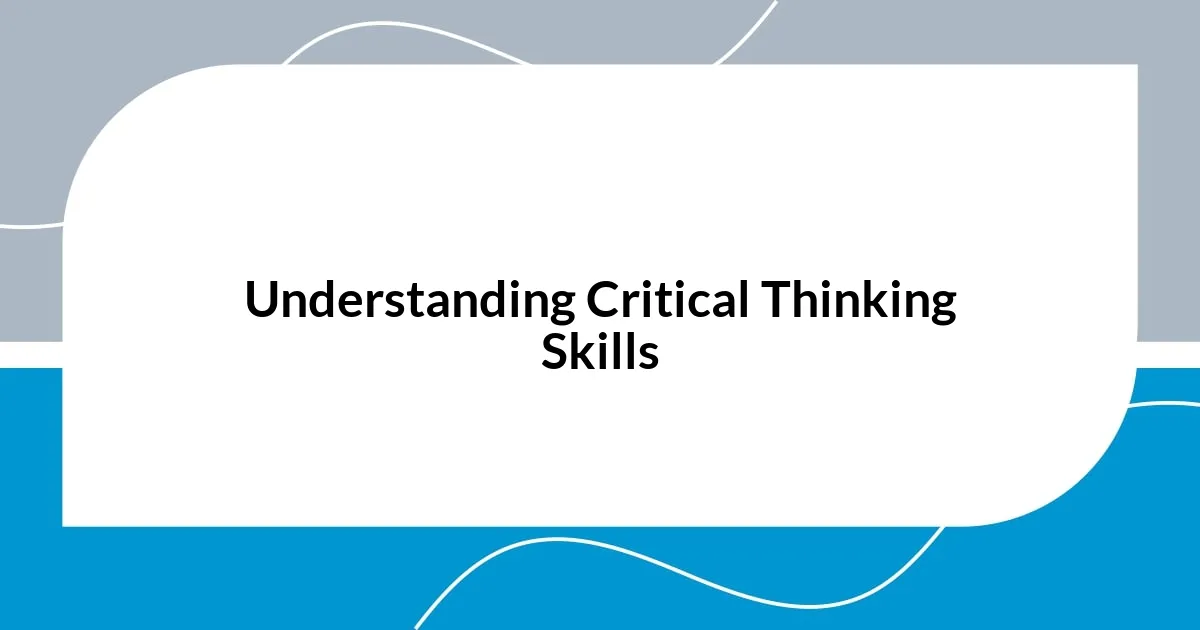
Understanding Critical Thinking Skills
Critical thinking skills are essential for navigating the complexities of everyday life. I remember the first time I faced a tough decision and felt overwhelmed with options. It struck me how critical thinking allowed me to sift through conflicting information and make an informed choice. Have you ever found yourself in a similar situation where simply thinking through the problem brought clarity?
At its core, critical thinking is about questioning assumptions and evaluating evidence. I find that this skill becomes particularly valuable when discussing controversial topics, as it challenges us to consider multiple viewpoints. Isn’t it fascinating how breaking down an argument can lead to a deeper understanding of an issue?
Developing critical thinking skills requires practice and reflection. I often engage in discussions where I intentionally ask open-ended questions, forcing myself to think more deeply. How often do we pause to reflect on our thought processes? By constantly challenging my perspective, I’ve noticed a significant enhancement in my ability to approach problems with a more analytical mindset.
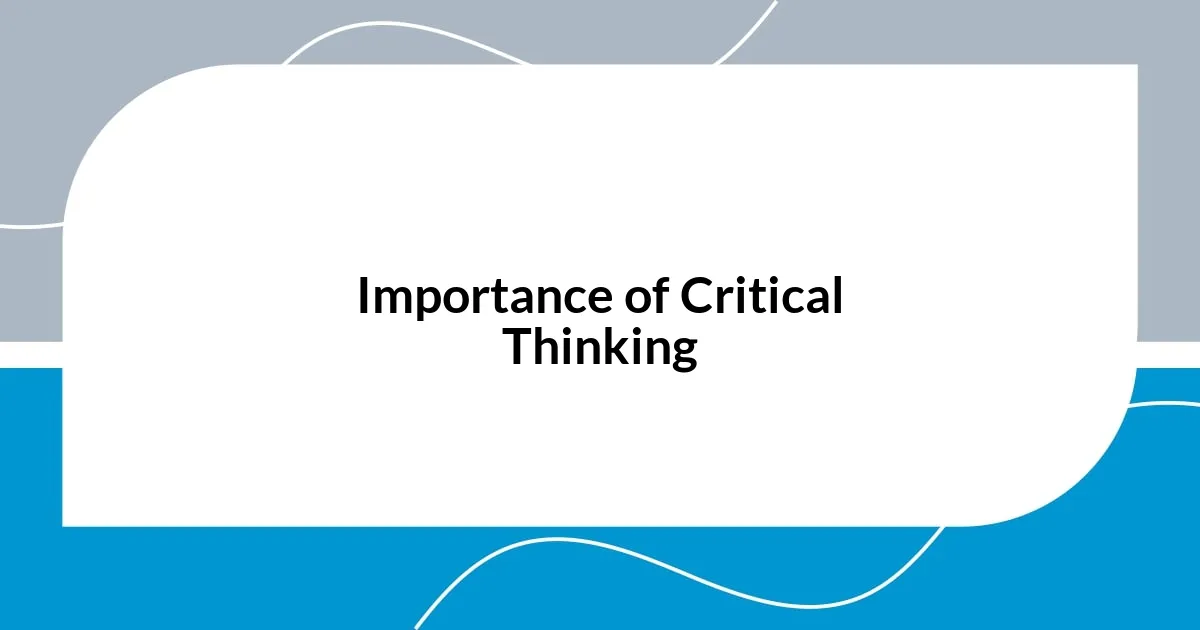
Importance of Critical Thinking
Understanding the importance of critical thinking is like shining a light on the path ahead. I recall a time when I was confronted with a critical choice regarding my career; the pressure to choose the right direction felt overwhelming. My ability to critically evaluate my options made all the difference. It’s a skill that not only illuminates the best course of action but also builds the confidence to stand firmly in my decisions.
Here are some compelling reasons why critical thinking is vital:
- Enhanced Problem Solving: It allows me to break down complex issues into manageable parts.
- Improved Decision-Making: I weigh the pros and cons more effectively, leading to better outcomes.
- Strong Communication Skills: Through critical thinking, I articulate my thoughts clearly and persuasively.
- Increased Open-Mindedness: I find myself more open to differing opinions, fostering deeper discussions.
- Self-Reflection: It encourages me to question my beliefs, ultimately leading to personal growth.
Critical thinking isn’t just useful; it’s essential for navigating life’s uncertainties with assurance and clarity.
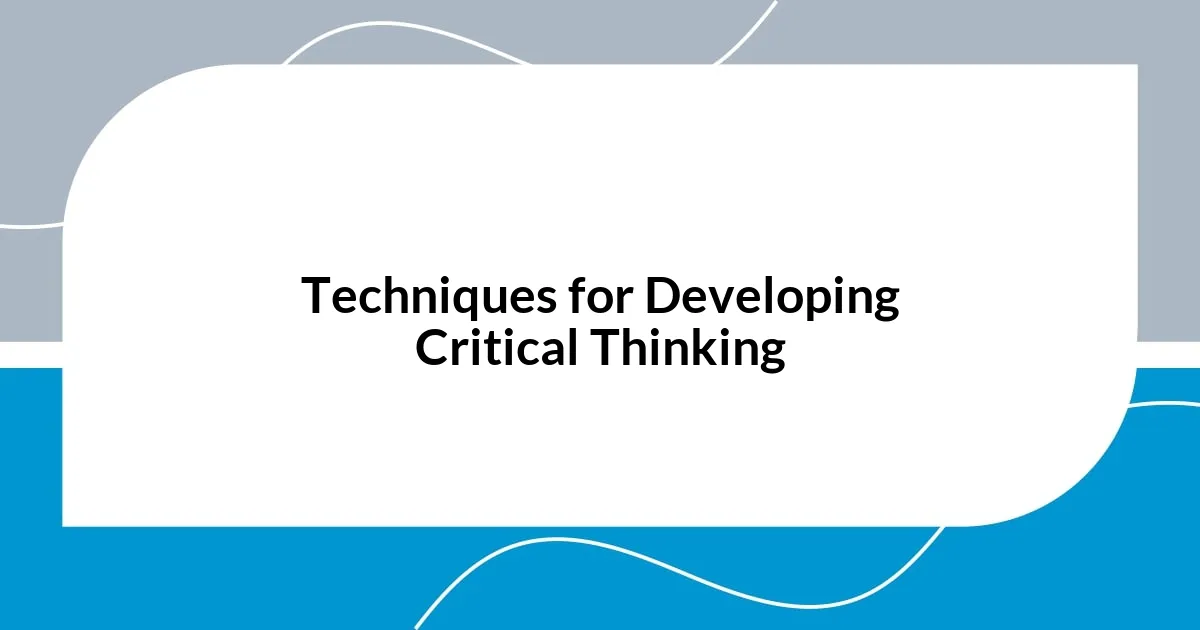
Techniques for Developing Critical Thinking
I’ve found that one of the most effective techniques for developing critical thinking is engaging in regular debate sessions. These lively discussions require me to construct solid arguments and anticipate counterarguments. I remember a weekend where my friends and I debated various societal issues, and it pushed me to consider angles I hadn’t before. Isn’t it invigorating when you realize that your perspective has shifted just by listening and engaging?
Another technique I often use is the practice of journaling my thoughts. By putting pen to paper, I can review my reasoning over time. During a challenging period of my life, writing about my decision-making processes helped clarify what truly mattered to me. It’s a bit like having a conversation with myself, allowing deeper insights to surface that I might overlook during daily chaos. Have you ever tried reflecting through journaling? It can truly bring your thoughts to light.
Lastly, I find that teaching others is a fantastic way to deepen my understanding of critical thinking. Explaining complex concepts to someone else forces me to break things down into simpler parts. I recall helping a younger cousin with math, and as I explained the concepts, I unexpectedly discovered new ways of looking at the problems myself. There’s something profoundly rewarding about sharing knowledge, don’t you think?
| Technique | Description |
|---|---|
| Engaging in Debate | Participating in discussions challenges my viewpoints and enhances my argumentation skills. |
| Journaling | Writing down my thoughts allows for reflection and helps clarify my decision-making processes. |
| Teaching Others | Explaining concepts to others leads to a deeper understanding and often reveals new insights. |
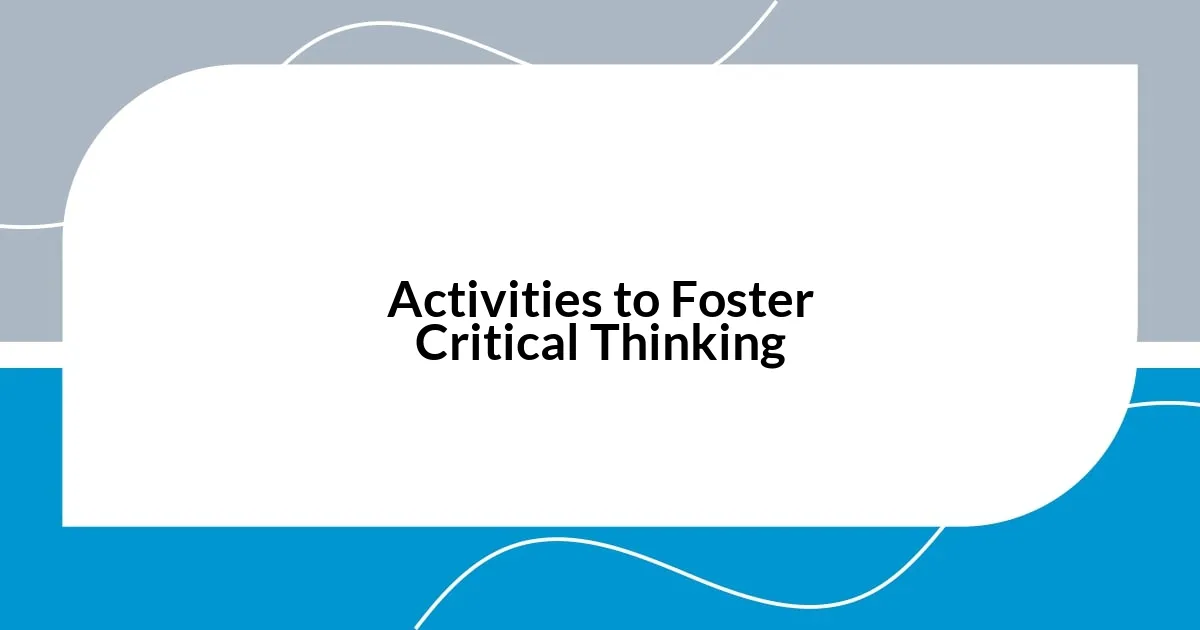
Activities to Foster Critical Thinking
Participating in role-playing exercises can be a powerful activity to foster critical thinking. I remember a workshop where we had to step into various characters’ shoes in a contentious scenario. It wasn’t just acting; it forced me to understand different perspectives deeply, illuminating how my biases colored my views. Have you ever noticed how much empathy you gain when you really think from someone else’s viewpoint?
Another engaging activity is solving puzzles and brainteasers. I stumbled upon a challenging logic puzzle one rainy afternoon that had me puzzled for hours. As I tried various strategies, not only did my perseverance increase, but I also discovered new ways to approach problems. The thrill of finally cracking it felt like unlocking a part of my own mind. Isn’t it fascinating how a simple puzzle can sharpen your thinking skills and spark creativity at the same time?
Additionally, group discussions with a focus on “what if” scenarios can significantly enhance critical thinking. I hosted a casual meetup where we explored hypothetical situations, like “What if technology disappeared overnight?” This imagination exercise not only tested our problem-solving abilities but also required us to consider long-term impacts and ethical implications. It was eye-opening how diverse our thoughts were on the topic, reminding me that the way we think shapes the future we envision. What kind of ideas might you come up with in such a setting?
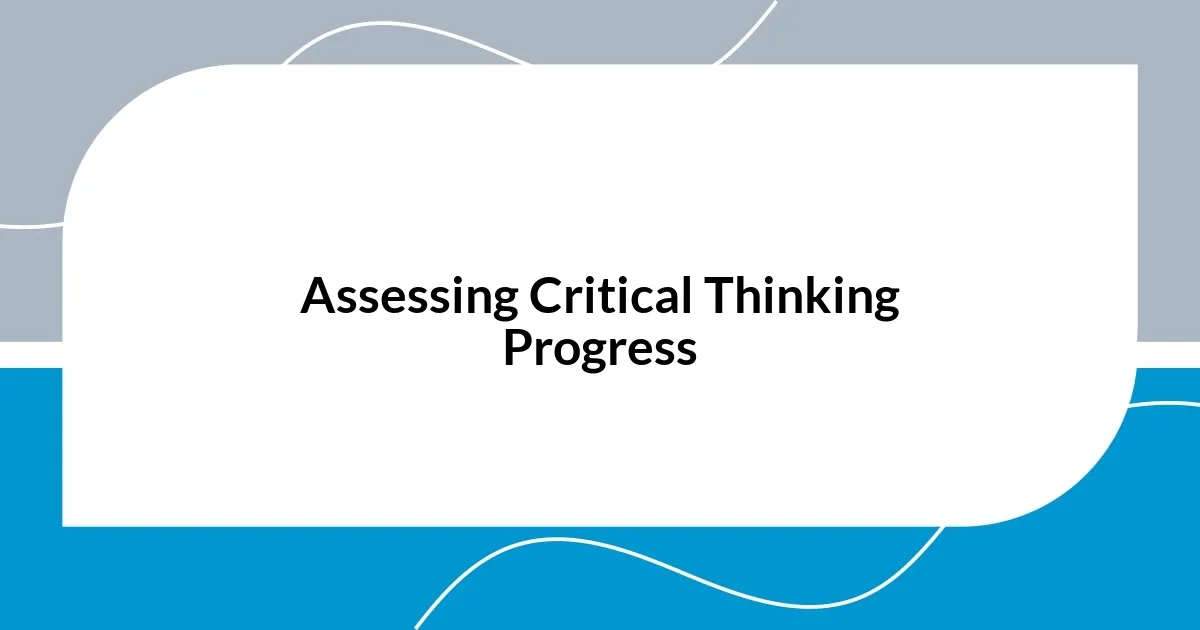
Assessing Critical Thinking Progress
Assessing critical thinking progress is best done through a mix of practical evaluations and reflective practices. In my experience, creating tasks that mimic real-world challenges has been a real eye-opener. For instance, I once set up a mock project where I had to analyze a controversial issue, gather data, and present my findings. The feedback I received from peers was invaluable, revealing gaps in my reasoning that I had previously overlooked. Have you ever had a moment where constructive criticism changed your viewpoint?
Another effective way I’ve tracked improvement is through self-assessment. After engaging in a discussion or completing a task, I ask myself pointed questions about how I approached the problem. This practice reminds me of an evening I spent revisiting my debate notes. As I critiqued my arguments, I noticed the evolution of my reasoning skills. It felt empowering to see tangible growth, making me curious about where my thoughts might lead next. Doesn’t it feel good to reflect on progress and identify areas for further exploration?
Lastly, I’ve found that peer feedback sessions can be incredibly revealing. I remember collaborating on a project with colleagues where we evaluated each other’s approaches. Hearing differing viewpoints not only expanded my understanding but also illuminated biases I hadn’t recognized. It’s moments like these that serve as a reality check for my critical thinking. Have you ever engaged in a feedback loop that challenged your assumptions? The insights gained can be a powerful catalyst for ongoing improvement.
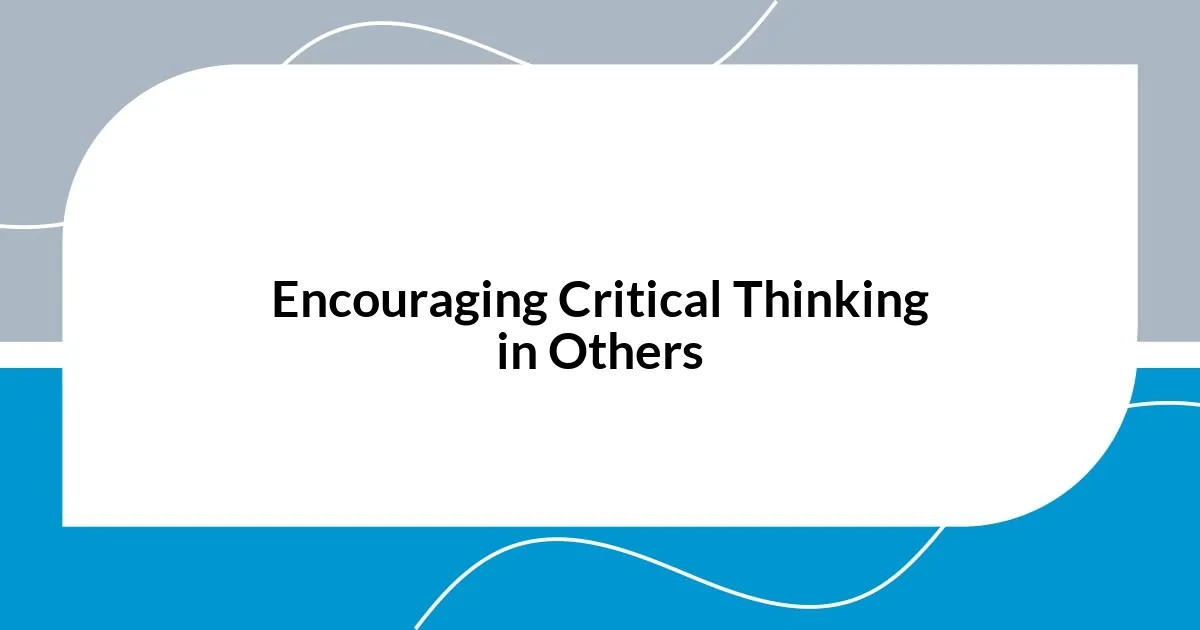
Encouraging Critical Thinking in Others
One effective way I’ve encouraged critical thinking in others is through Socratic questioning. I recall hosting a discussion group where I intentionally posed open-ended questions that pushed participants to think deeply about their beliefs. Instead of providing answers, I watched as they grappled with complex ideas, leading to lively debates. Have you ever seen how the simple act of questioning can ignite a whole new level of thought?
In another instance, I introduced a reflective journal exercise to my peers. Each week, I prompted them to articulate their thoughts on a specific issue and analyze their reasoning process. I was surprised at how quickly people began to uncover their assumptions and biases. It’s like peeling back layers to reveal a more profound understanding; don’t you think self-reflection can illuminate pathways we hadn’t considered before?
Additionally, I believe that sharing personal dilemmas can be a powerful tool. During a team meeting, I opened up about a tough decision I was facing and invited feedback. This vulnerability sparked a discussion that not only helped me refine my thinking but also created a supportive environment for others to share their own challenges. Isn’t it fascinating how our individual experiences can enrich group dialogues and foster critical thinking as a collective?
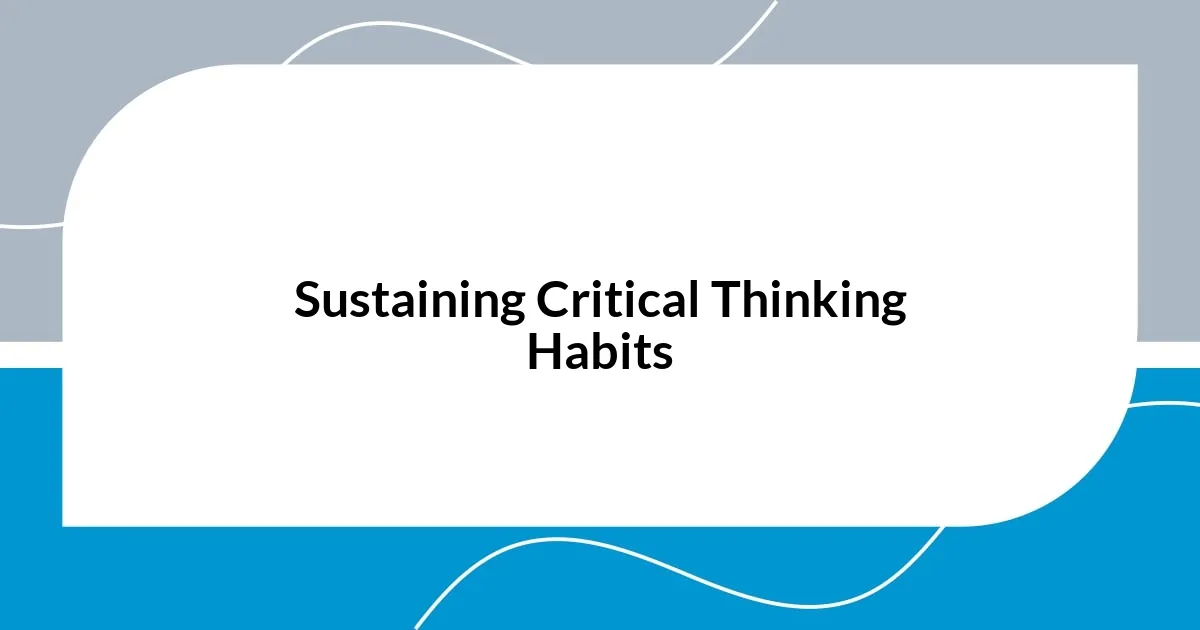
Sustaining Critical Thinking Habits
Sustaining critical thinking habits requires intentionality. I’ve learned that daily engagement with thought-provoking materials, like articles or documentaries, stimulates my mind. Just the other day, I stumbled upon a documentary that challenged my perspective on a societal issue. As I watched, I found myself questioning everything from the filmmaker’s biases to my own preconceived notions. Have you ever thought about how a single piece of content can shift your entire viewpoint?
Another practice that has worked wonders for me is establishing a consistent routine for reflection. Setting aside just 10 to 15 minutes each evening for quiet contemplation has become a cherished habit. During one of these sessions, I found myself dissecting the way I approached a complex problem earlier that day, unraveling my thought process like an intricate tapestry. Isn’t it amazing how carving out a little time can lead to significant insights and foster a deeper understanding of our own thought patterns?
Lastly, surrounding myself with diverse thinkers has been a game-changer. Engaging in conversations with people who hold different viewpoints often leads to unexpected breakthroughs in my thinking. I remember a dinner with friends where we debated a contentious current event. Each argument presented sparked new questions in my mind and illuminated biases I hadn’t noticed. Have you experienced that electrifying moment when a discussion opens your mind to a wider world of possibilities? Keeping those thought-provoking dialogues alive is essential for nurturing critical thinking in the long run.